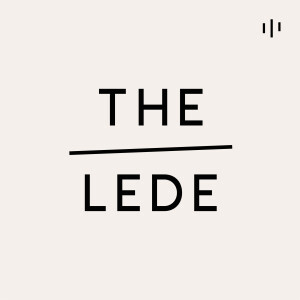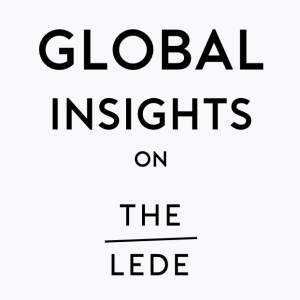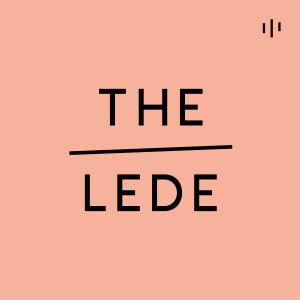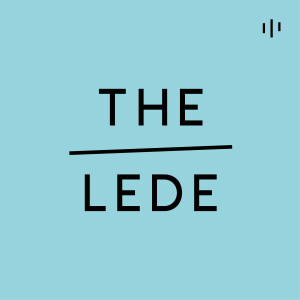Episodes

Friday Jun 07, 2024
Friday Jun 07, 2024
On June 8, 1924, two climbers set off for what they hoped would be the first-ever summit of Mount Everest. As the mist closed in around them high up the mountain, they would never be seen alive again. A century later, the mystery of whether they reached the top continues to inspire fascination and debate, but is perhaps not the most interesting thing about the doomed expedition, anthropologist and former National Geographic Explorer-in-Residence Wade Davis tells New Lines’ Finbar Anderson on this week’s episode.

Friday May 31, 2024
Friday May 31, 2024
In the two decades after the collapse of the Soviet Union, Russian influence in Africa was at a low ebb. But that’s all changed, New Lines Global News Editor Amie Ferris-Rotman tells Kwangu Liwewe on this week’s Global Insights on The Lede. Ferris-Rotman and Liwewe discuss Russia’s past in Africa and its more recent neocolonialist enterprises on the continent, as well as the private military companies acting as Russia’s enforcers and how Russian influence compares to the “long, slow game” played by China.
Produced by Finbar Anderson

Friday May 24, 2024
Friday May 24, 2024
Veteran Mexican correspondent Alma Guillermoprieto joins New Lines’ Danny Postel on The Lede for a discussion about how the upcoming election in Mexico is actually not about the two leading candidates, her sadness about the current situation in Nicaragua, and her secret — the celebrated journalist is not interested in politics.
Produced by Finbar Anderson

Friday May 17, 2024
Friday May 17, 2024
On this week’s episode of The Lede, New Lines' Lydia Wilson sits down with extremism researcher Elizabeth Pearson, whose book “Extreme Britain: Gender, Masculinity and Radicalisation,” was published in December 2023.
Pearson explains how her research challenged established thinking around extremism, and how she came to the understanding that misogyny and masculinity play a much bigger role in the radicalization process than has been previously thought.
Produced by Finbar Anderson

Friday May 10, 2024
Friday May 10, 2024
On this week’s episode of The Lede, New Lines’ Faisal Al Yafai sits down with Jasmin Mujanović for a discussion on nationhood in Bosnia and Herzegovina after the genocide of the 1990s, its current political challenges and Mujanović’s argument for a liberal democratic future in Bosnia. Mujanović dissects his new book, “The Bosniaks, Nationhood After Genocide,” which explores the evolution of Bosniak identity after the Bosnian War, and why the country’s postwar settlement needs to change.
Produced by Finbar Anderson

Friday May 03, 2024
Friday May 03, 2024
Ruby Lal’s new biography of the Mughal Princess Gulbadan brings to life the princess’s remarkable seven-year pilgrimage, from her home in the harem of her nephew Emperor Akbar in India to the holy city of Mecca. Surviving shipwrecks and expulsion orders from the Ottoman Sultan, Gulbadan eventually returned to India where she would go on to write groundbreaking works.
Lal joins New Lines’ Rasha Elass on The Lede to discuss her book “Vagabond Princess: The Great Adventures of Gulbadan,” which is based on Gulbadan’s own long-forgotten writings.
Produced by Finbar Anderson

Friday Apr 26, 2024
Friday Apr 26, 2024
New Lines Contributing Editor Lisa Goldman has spent much of her life living and working in Israel, but her most recent reporting trip revealed a side of the country she had not seen before. “It’s unprecedented,” she tells New Lines Africa Editor Kwangu Liwewe on Global Insights.
“Israelis feel for the very first time that their army couldn’t protect them, it didn’t protect them. They had been living with a very strong sense of confidence that whatever happened, they were physically secure because they had such a well-trained army and a highly efficient intelligence system. And all of that broke down on Oct. 7.”
Goldman shares the insights she gained from the ground, including how local media helps to drive support for Israel’s war in Gaza, personal tensions with her old friends brought about by the conflict and what it was like when Iran bombarded Tel Aviv with over 300 drones and missiles while she was there.
Produced by Finbar Anderson and Erin Brown

Friday Apr 19, 2024
Friday Apr 19, 2024
“Going into Gaza, that pit of fear was more like a web that sat on my chest and never settled.”
Arwa Damon has been in plenty of war zones, but going into Gaza was unlike anything she’s yet experienced.
The veteran CNN correspondent joins New Lines’ Faisal Al Yafai on The Lede for a conversation about her recent humanitarian mission into the Palestinian territory. They discuss the moving and heartbreaking human interactions Damon had with Palestinians in Gaza, the Israeli strike on the World Central Kitchen convoy that killed seven aid workers just days before Damon’s trip, and the lasting impact of journalists not being allowed into Gaza to cover the conflict.
Damon also picks up on the topic she discussed in her last appearance on The Lede. Back in November, she spoke with Al Yafai about how trauma impacts decision-making in situations like the Israel-Hamas conflict. That episode, titled “The Emotional Fog Of War,” has since been nominated for multiple awards.
Further listening: The Emotional Fog Of War — With Arwa Damon
Further reading: Gaza in a Million Pieces
Produced by Finbar Anderson

Friday Apr 12, 2024
Friday Apr 12, 2024
Early Arabic hunting poetry showcases a fascinating overlap between the pre-Islamic world, which was dominated by the concepts of fate and time, and the post-Islamic world, in which the standout theme was an omniscient or omnipotent god. “The wise thing about the poetry is it doesn’t seek to reconcile the two, it allows both to coexist,” says Montgomery, Sir Thomas Adams's professor of Arabic at the University of Cambridge, who joins New Lines Culture Editor Lydia Wilson on The Lede.
Montgomery tells Wilson how poetry is a portal to the pre- and early Islamic worlds, and how, after struggling with one set of translations for over 20 years, inspiration came from an unlikely source: YouTube.
Further reading: The Seven Hanging Odes of Mecca
Produced by Finbar Anderson and Joshua Martin
For more information go to newlinesmag.com/podcast

Friday Apr 05, 2024
Friday Apr 05, 2024
For Alex Rowell, the need to reassess the legacy of former Egyptian President Gamal Abdel Nasser has only increased in the decades since the death of the hugely influential figure, and especially recently.
“If you just take a moment to look at the Arab Spring and the countries in which the largest protests occurred, and the regimes against which millions so courageously rose up … they were precisely the regimes that were the most direct legacies of Nasser’s time in power,” Rowell, New Lines’ online editor and author of “We Are Your Soldiers: How Gamal Abdel Nasser Remade the Arab World,” tells Joshua Martin.
Rowell and Martin consider Nasser’s enduring impact up to the present day, including Israel’s ongoing war in Gaza.
Further reading: Hoping to Channel Nasser, Egypt’s Sisi Provokes a Backlash
Produced by Finbar Anderson
For more information go to newlinesmag.com/podcast





